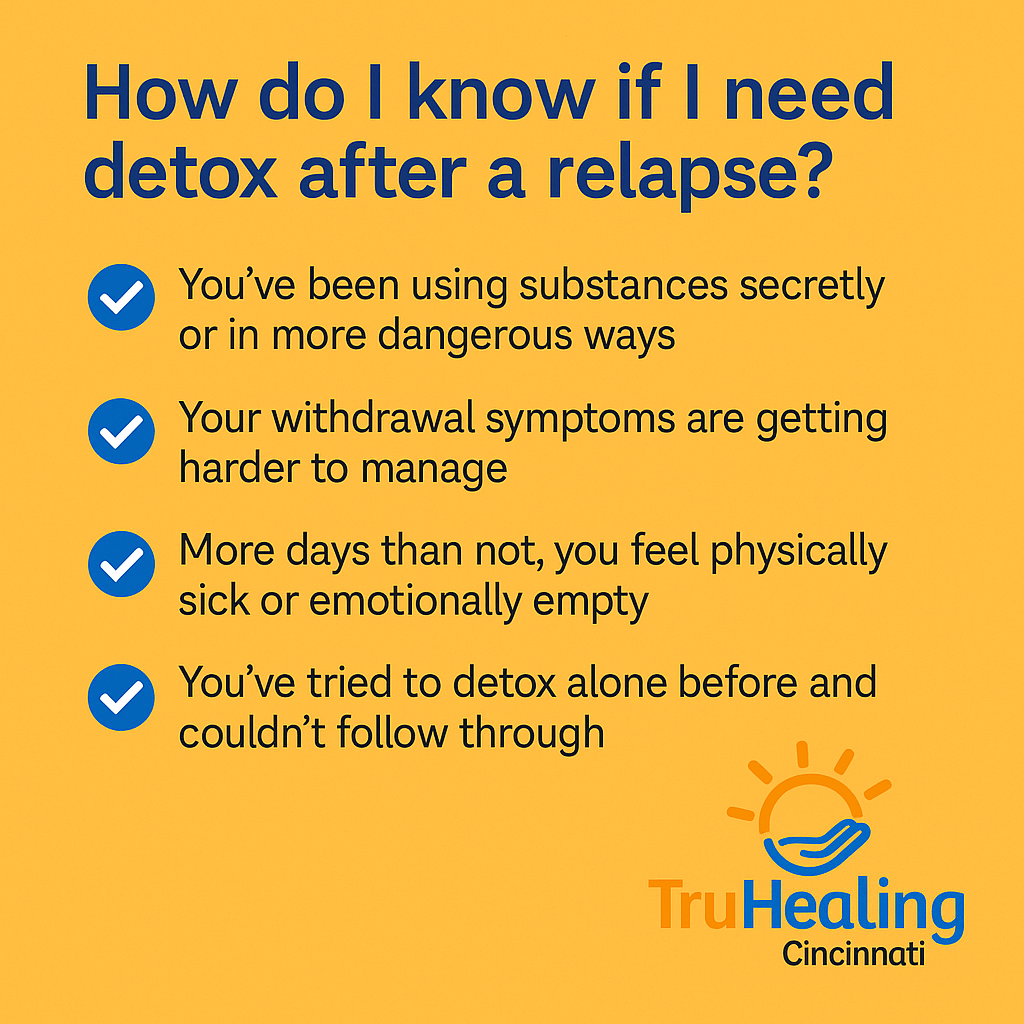Relapse Wasn’t in My Plan. But Neither Was Giving Up.
The first time I got sober, I really believed it would stick. I followed the steps, I built a community, I celebrated my milestones. I made it past 90 days. Past 120. Past a full year. And when I got my one-year chip, I felt… proud. And scared.
Because somewhere in the back of my mind, I knew I hadn’t really looked at the stuff underneath.
I white-knuckled through grief I never named. I buried trauma that still shaped my choices. I got busy instead of getting honest. And over time, the foundation I thought I’d built started to crack.
When I relapsed, I didn’t fall apart right away. I showed up to work. I answered texts. I told myself it was “just this once” and “not like before.” But the truth? It was exactly like before—just slower.
Eventually, the fear came back. The isolation. The mornings I couldn’t remember. The ache that said, You’re not okay.
I didn’t think I’d need detox again. But I did. And walking through the doors at TruHealing Cincinnati—ashamed, exhausted, scared—I was met with something I didn’t expect.
Compassion. No lectures. No shame. Just people who understood that relapse isn’t the end.
Why Relapse Doesn’t Mean You Failed
I used to believe that relapse erased everything I’d built. That slipping up meant I’d blown my chance, and that I’d have to start all over.
But that’s not how recovery works.
Relapse isn’t proof that you’re weak. It’s proof that you’re still hurting somewhere. That something in your system still needs support—physically, emotionally, spiritually.
It took me a long time to admit that I was scared to ask for help again because I thought I should be better than this. But detox isn’t about shame. It’s about safety. It’s about clearing space in your body and mind so you can come back to yourself.
TruHealing Cincinnati reminded me of that. They didn’t treat me like someone who failed. They treated me like someone who was brave enough to return.

Why I Chose a Medical Detox Program the Second Time
This relapse hit me differently. I wasn’t bingeing the way I used to. But I was using in a more dangerous way—quietly, in secret, with less tolerance and more risk. I felt physically sick most days and emotionally empty on the rest.
I knew if I tried to detox at home, it could get ugly—or even dangerous.
That’s why I searched for a medical detox program in Cincinnati. I needed more than just a quiet room. I needed clinical support. I needed people who could monitor my health and keep me safe through withdrawal. And I needed people who wouldn’t look at me like I’d ruined everything.
That’s what I found at TruHealing Cincinnati.
What It Felt Like to Walk Back Into Detox
There was a moment—right before I walked in—where I almost turned around. Not because I didn’t want help. But because I was so afraid of being judged.
But no one judged me.
The intake staff talked to me like I was a person—not a problem. Nurses checked me in gently and explained everything step by step. A peer support staff member even sat with me when I couldn’t stop crying. She said, “You’re not the only one who’s been here twice.” That sentence broke something open for me. In the best way.
The first few days of detox were hard, physically and emotionally. But I never felt alone. The medical team tracked my progress, adjusted my meds when needed, and made sure I had someone to talk to when the mental fog started to lift.
Most importantly, I was safe. And being safe gave me room to begin again.
What I Did Differently After Detox This Time
I didn’t walk out of TruHealing Cincinnati cured. But I did walk out changed.
This time, I didn’t rush back to work. I didn’t pretend everything was fine. I didn’t ghost the people trying to help me. Instead, I transitioned into extended support. I kept my therapy appointments. I joined a community that understands relapse, not just early sobriety. I stopped trying to “get back to normal” and focused on building something new.
Because the truth is: relapse didn’t put me back at zero. It showed me where I needed to go deeper.
Today, I still check in with my recovery support team. I still get cravings. But I’m no longer ashamed of that. It’s part of the process—and I’m proud I’m still in it.
If You’re Scared to Ask for Help Again, You’re Not Alone
If you’ve relapsed, I know what you’re thinking. You’re not sure you deserve another chance. You’re wondering if the pain of starting over is worth it. It is. If you’re local to Lexington, Kentucky or Springfield, Ohio, TruHealing offers help that meets you exactly where you are.
TruHealing Cincinnati’s medical detox program isn’t just for first-timers. It’s for anyone who’s ready to reclaim their sobriety—even if they’ve lost it before.
Call (513)643-9117 to speak to someone who gets it. Someone who won’t judge. Someone who’s walked the road back—and knows there’s still a way forward.
Relapse & Detox: What You Might Still Be Wondering
Do I really need detox again if I’ve done it before?
If you’ve relapsed and are using again regularly, detox may still be necessary—especially for safety. Withdrawal can be unpredictable, and previous detox does not guarantee immunity from symptoms.
Is medical detox different the second time?
The process is similar, but your treatment plan may be tailored differently based on your relapse, health changes, and emotional state. TruHealing Cincinnati adjusts care to meet you where you are now—not where you were then.
Will the staff judge me for relapsing?
No. Relapse is part of many people’s journey. At TruHealing, the team includes people with lived experience who understand relapse and offer compassion, not shame.
Can I go straight from detox into another level of care?
Yes. Many clients transition from medical detox into residential or outpatient programs. The staff will help you create a plan that fits your needs and supports your long-term recovery.
What if I’ve relapsed more than once?
You’re still welcome. You’re still worthy of help. Detox isn’t about how many times you’ve tried—it’s about making sure you stay alive long enough to heal.


